Geospatial Vanguard
Southeast Asian start-ups innovate on climate solutions
Ignite India’s tailored, place-based approach
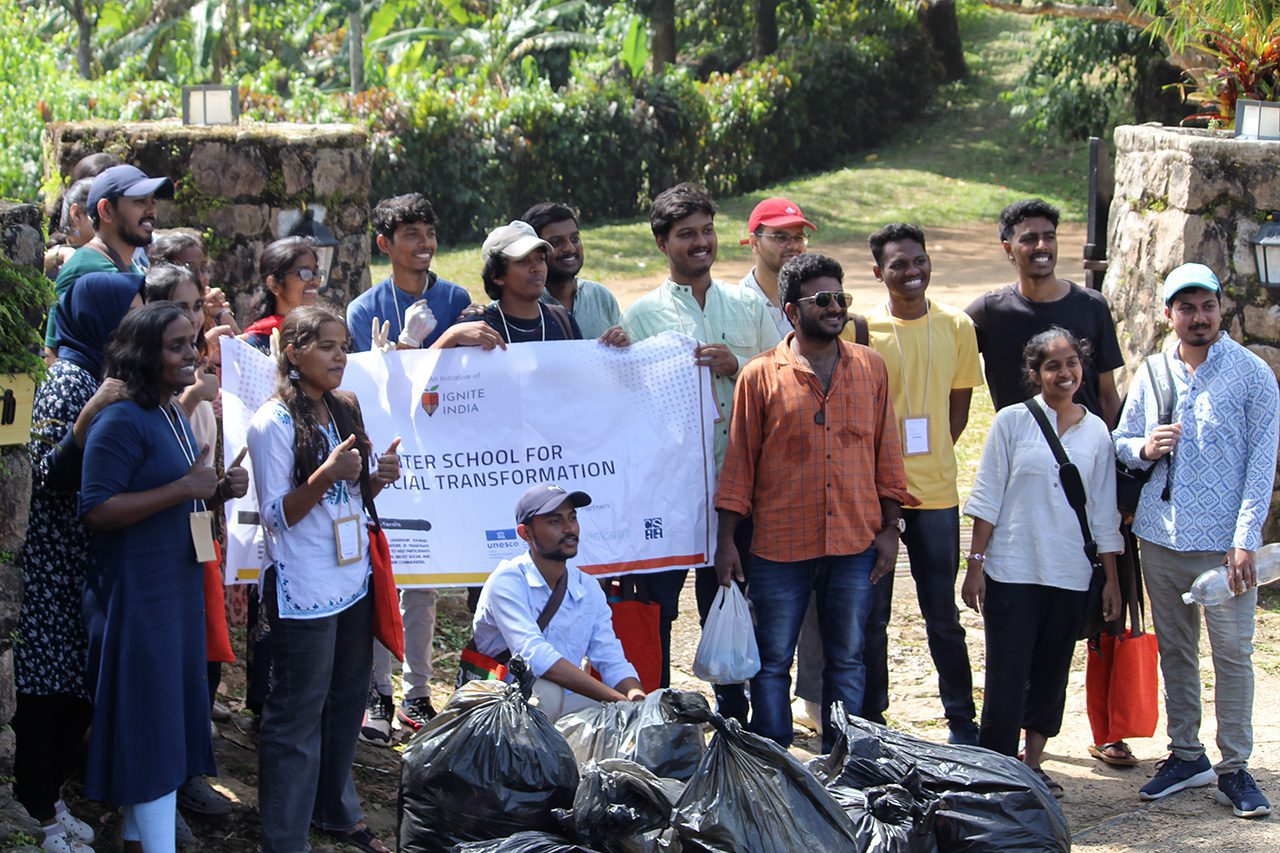
Experiential learning, also known as “learning by doing,” is revolutionizing educational paradigms beyond the conventional classroom. This dynamic approach champions active engagement with learning material, thrusting participants into hands-on experiences and real-world problem-solving scenarios. Far removed from the passivity of rote memorization or textbook learning, it fosters a robust skill set in critical thinking, problem-solving, and teamwork through the rigors of practical application and experimentation.
Recently, forward-thinking educators have embraced experiential learning as a key tool to instill the principles of sustainable development in the youth. This pedagogical shift recognizes its profound influence on shaping perspectives and fostering a proactive mindset. While this progressive trend flourishes in Western educational systems, its adoption has been sluggish in South Asia, leading to a critical gap in creative and original thought crucial for crafting sustainable solutions. This lag highlights a pressing need for curricular evolution that encourages innovative problem-solving in the face of global environmental challenges.
In response to the pressing need for sustainable innovation, Ignite India — a visionary social enterprise from Kerala—is championing the use of experiential learning to spur personal and societal transformation. Recognizing that true social progress stems from unleashing human potential, Ignite India has launched its pioneering initiative, the School of Social Transformation. This program is designed as an introspective voyage, guiding participants through the rich interplay between hands-on learning experiences and the principles of sustainable development. The result is a holistic development framework that not only fosters social capital but also instills a sense of communal responsibility and innovation in its participants.
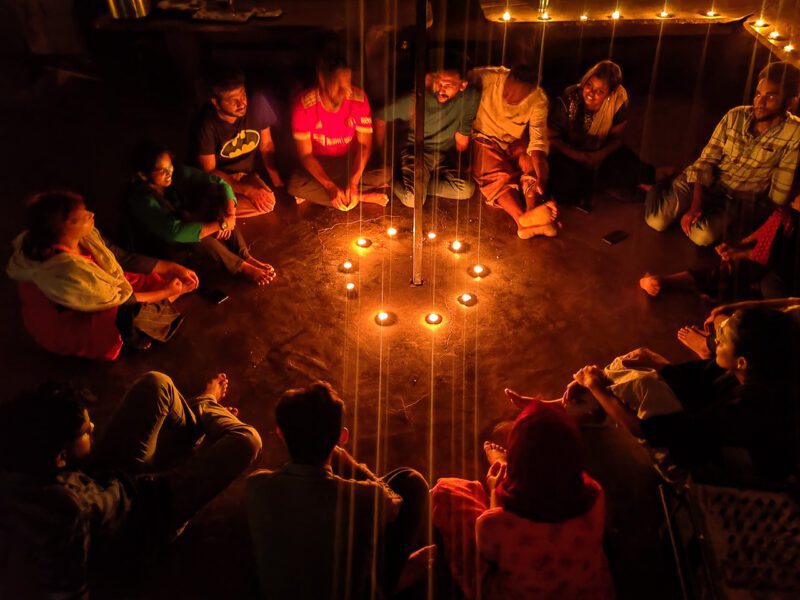
A reflection circle during Ignite India’s School for Social Transformation
The connection is multifaceted. By engaging students in practical and immersive experiences, educators can help them develop a deeper understanding of sustainability issues. Learners witness how human actions affect the environment firsthand. By going on field trips or taking part in service projects, learners can observe the negative impact of unsustainable practices on the human-nature-economies ecosystems. This direct experience fosters a sense of empathy and urgency in them to act.
Socio-cultural and environmental challenges manifest uniquely across diverse regional landscapes, each demanding original solutions fostered by in-depth research and practical experimentation. Ignite India understands this geographical nuance and empowers learners to delve into these issues with a hands-on approach. By directly engaging with real-world scenarios, students are encouraged to channel their innate creativity into groundbreaking innovations that respond to the distinct needs of their communities.
Jaseel C K, the co-founder and chief innovation officer of Ignite India, shares his vision for transformative experiential education. “Our objective is to illuminate the path of social transformation that our current education system often obscures. For example, during a field visit in Rajasthan, I was confronted with the reality that the local water supply contains naturally high levels of fluoride — far beyond what’s added in the West for dental health. In such quantities, fluoride can be detrimental, leading to health issues rather than preventing them. Despite my background in chemical engineering, my formal education had never addressed how one might mitigate this issue. It was a revelation, highlighting the gap between our academic curriculum and the pressing needs of communities. It made me wonder: How many students are unaware that their skills could forge solutions to real-world problems like this?”
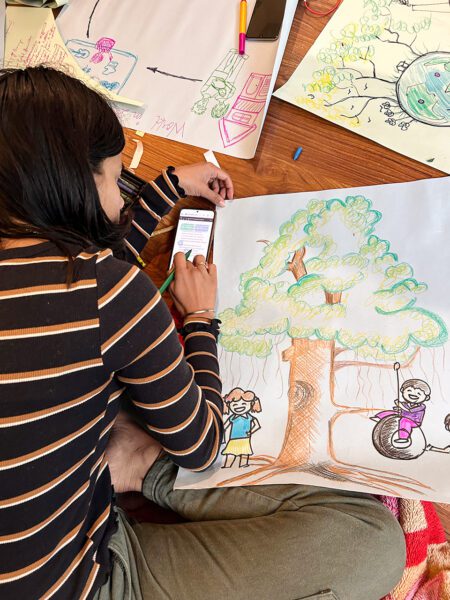
Participant working on her imaginary world of 2040 during School for Social Transformation
The methodology of experiential learning is not a one-size-fits-all model; it is dynamic and varies to suit the specific needs of each community. At the heart of Ignite India’s educational philosophy is a steadfast commitment to the foundational principles that guide this adaptable approach. In crafting its bespoke School of Social Transformation, Ignite India has designed a five-stage method—Forming, Framing, Engaging, Reflecting, and Action. This structured yet flexible strategy ensures that learning is intimately connected with the distinct challenges and opportunities within local contexts, thereby fostering solutions that are as innovative as they are impactful.
Ignite India’s transformative journeys begin in the embrace of nature, where groups of 15 to 20 young individuals gather to embark on a path not only to societal change but personal growth as well. This initial stage is more than an introduction to social issues; it’s an inward quest that lays the foundation for all subsequent learning. Jaseel underscores this introspective stage: “Understanding self is the core element of the first phase of this goal for social transformation.” As participants progress, they experience a profound shift—from inward reflection to outward action, understanding the ripple effect of their actions on the environment and its inhabitants. This gradual awakening propels them from isolated efforts to a collective consciousness, recognizing their personal impact on the greater web of life.
“When it comes to even sustainable development goals, we do not directly speak about the 17 SDGs goals and targets. Instead, we go through stories – stories of the people who are suffering, who are going through these crises. We talk about inequality, we talk about poverty, we talk about the environment, we talk about gender. We take our learners to the place where these are happening to connect them to the context,” shares Naji Mahfood, co-founder and learning designer.
By directly engaging with real-world scenarios, students are encouraged to channel their innate creativity into groundbreaking innovations that respond to the distinct needs of their communities.
“For the next phase, we have designed a Dreamers Festival, in which they go through a process of visualization. They create a map of the world that they imagined. We named it Vision 2040. So, they describe a world in 2040 that they want to live in. We believe that imagination is the first step towards implementation,” he further illustrates.
The journey then progresses to a pivotal stage: implementation, where learners translate insights into action.
Facing the complex tapestry of societal issues, the question arises: where does the responsibility lie? Is it with government policies, individual behaviors, educational structures, or industry practices? Ignite India encourages learners to move beyond the simplicity of assigning blame. Instead, they are introduced to systemic thinking, a holistic approach to understanding and navigating the intricate realities of our world.
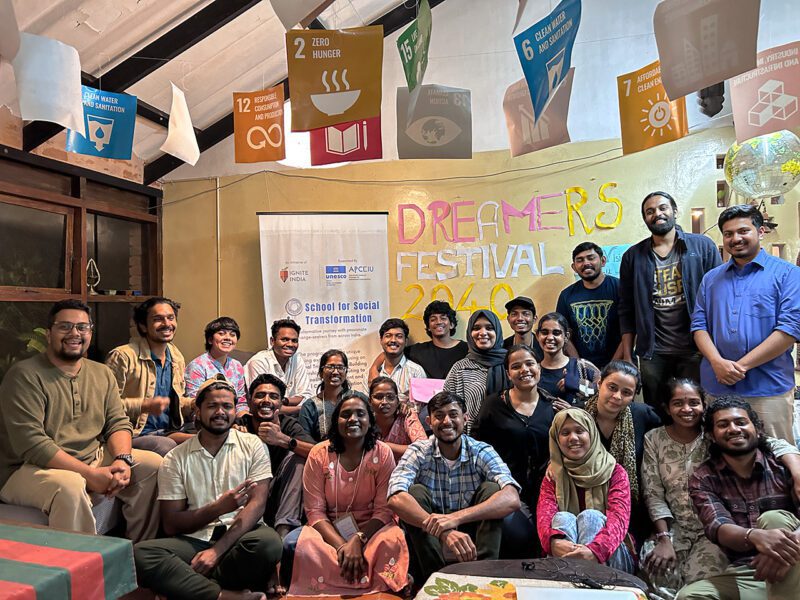
Dreamers Festival during School for Social Transformation
In this critical phase, learners engage deeply with problem identification and adopt a design thinking process that spurs innovation. This methodical approach culminates in the practical application of solutions within chosen communities, carried out over a three-month period under expert guidance. Ignite India is not just an observer in this process; the organization actively provides support in the scaling of these community-driven initiatives, fostering a new generation of change-makers equipped to make a sustainable impact.
The School of Social Transformation at Ignite India is more than an educational program—it’s an incubator for model social enterprises, empowering participants to turn their innovative ideas into tangible actions. Unlike traditional academic internships that often prioritize workforce entry, this program redefines success: it sees people development as the true currency of social advancement. It nurtures aspiring change-makers, equipping them with the conviction that they are not just future employees, but architects of sustainable economic growth. By fostering this mindset, Ignite India envisions a world where young people are not merely part of the system but active creators, shaping a future where economic progress and sustainability are one and the same.
Related Content
Comments
Deep Dives
RECENT
Editor's Picks
Webinars
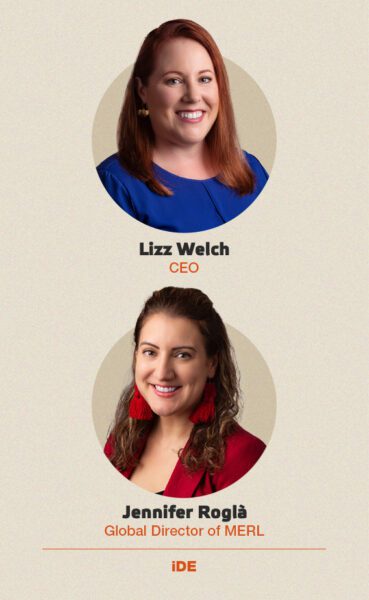
Featuring
Lizz Welch & Jennifer Roglà
iDE
May 16 - 12:00 PM EST

Impact Encounters
May 22 - 6:30 PM EST
News & Events
Subscribe to our newsletter to receive updates about new Magazine content and upcoming webinars, deep dives, and events.
Become a Premium Member to access the full library of webinars and deep dives, exclusive membership portal, member directory, message board, and curated live chats.
0 Comments